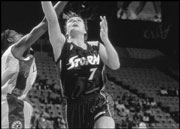THE SEATTLE STORM may not have won many games last year, but the women’s basketball team did win many hearts in the lesbian community. As the WNBA’s Storm opens their second season this week hoping to improve on their 6 wins and 26 losses last year, the team plans to continue their pioneering efforts at being gay-friendly. Last year, the Storm established itself as a WNBA leader in marketing to the gay and lesbian community by taking out ads in gay publications, organizing a Gay Pride night featuring discounts for gay and lesbian groups of 15 or more, and giving blocs of tickets to gay community groups. “It seemed like a logical choice for us to market to these organizations,” says Valerie O’Neil, the Storm’s PR director.
The lesbian community has responded to the outreach enthusiastically, says Helen Argus of the Lesbian Resource Center. Storm games have become a meeting place for lesbians, a place to see-and-be-seen. “There’s a pretty good percentage of season ticket holders that are lesbians,” says Argus, who herself holds season tickets. The Storm has “given [the Lesbian Resource Center], on occasion, some blocks of tickets to encourage the gay and lesbian community to come to the games. They are planning to do so again this year.”
Unfortunately, not all teams in other cities are as progressive as the Storm. In some places, the WNBA has been accused of hostility toward its substantial lesbian fan base. Last year, a group of New York Liberty fans held a “Lesbians for Liberty” banner in Madison Square Garden and were confronted several times by ushers who tried to confiscate the banner. The Los Angeles Gay and Lesbian Center were told they could not use the words “gay and lesbian” on their banner at an L.A. Sparks game. Similarly, the Sacramento Monarchs would not allow a group called “Davis Dykes” to be listed on the overhead scoreboard with other groups that bought a block of tickets. (Monarchs owner Joe Maloof later apologized.)
The league itself has been criticized by former player Valerie Still, who is straight, as having an unwritten “don’t ask, don’t tell” policy that discourages players from coming out. Two years ago Still wrote an article in The New York Times that accused the WNBA of “selectively marketing heterosexual players,” while downplaying its gay members. Still claimed that more than half of the players in the WNBA are lesbians, and few around the league dispute that number.
Despite a substantial lesbian presence in the WNBA, no players or coaches, and only one executive, Carol Blazejowski of the New York Liberty, have come out of the closet. Players routinely duck personal questions, using ambiguous words like “partner” and “significant other” when discussing their private lives. While it’s likely that many players choose not to discuss their sexual orientation for reasons of personal privacy, Still and others believe the league has played a role in encouraging players to stay closeted.
If the WNBA wants continues to grow as a league, they could look to the Storm as an example of how to reach out to all fans. As the Storm’s O’Neil points out, it’s good for the bottom line. “We reach out to different groups around the city such as the Girl Scouts, the U.S. Postal service, and other corporations and associations.” She adds with satisfaction, “We targeted gay and lesbian organizations, and the promotion was quite successful.”





